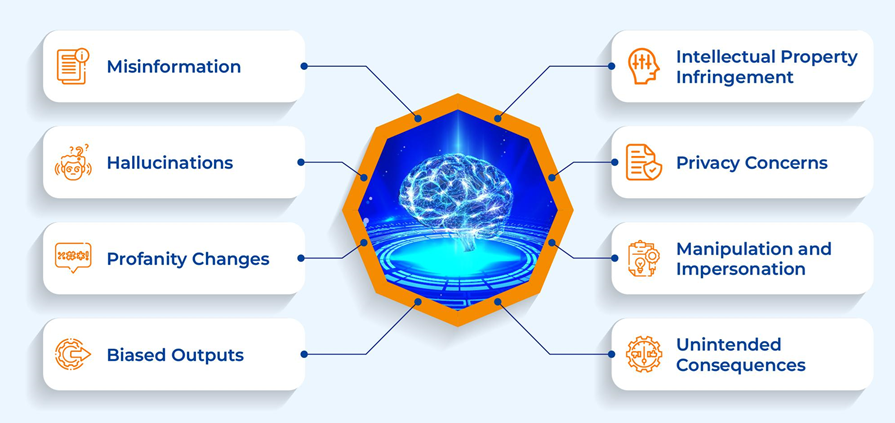STAND UP TO BREAKING NEWS
Relevance:
- GS 3 – Science and Technology- developments and their applications; Awareness in the fields of IT, Space, Computers, robotics, nano-technology, biotechnology and issues relating to intellectual property rights.
- GS 4 – Ethical concerns and dilemmas in government and private institutions; Information sharing and transparency in government
Why in the News?
- Recent Forbes article describes Perplexity’s (an AI powered answer engine) actions as ‘cynical theft’.
- AI summaries often lack the precision required for accurate news reporting.
- Unlike Wikipedia, AI summaries don’t have human oversight or verification processes.
- Risk of Spreading Unverified Information:
- AI can unintentionally pick up and present unreliable or unverified information from articles as facts.
- Users who are not knowledgeable or unable to identify inaccuracies may accept AI-generated summaries as accurate news.
Perplexity – An AI Application
- Wikipedia-like Approach to News: Parses through verified news sources.
- Compiles information into an easy-to-understand format with key facts.
- Interactive Question-Answer Feature: Allows users to ask questions.
- Generates answers on the fly based on sources.
- Perplexity as an ‘Answer Engine’:
- Perplexity positions itself similarly to a search engine. Publishers allow search engines to scrape content because it drives traffic back to their sites.
- Different from Search Engines: Search engines index content and direct users to original websites, creating a symbiotic relationship.
- Concerns About Perplexity :
- Content Aggregation Issues: Perplexity takes content without permission. Republishes work, presenting itself as though it were a media outlet.
- Forbes article describes the actions of Perplexity as plagiarism, Not Copyright Violation.
- Reduces traffic to original sources: Perplexity and AI summaries address user needs directly, reducing traffic to original sources.
- Content Aggregation Issues: Perplexity takes content without permission. Republishes work, presenting itself as though it were a media outlet.
Comparison with Wikipedia:
| Role of Wikipedia | Role of Perplexity |
| ↪Wikipedia aggregates information from sources and links out to them.
↪It serves as an encyclopaedia, not a source of news. ↪Wikipedia enables the discovery of news sources for more context. |
↪Perplexity aggregates and presents context from news sources.
↪Unlike Wikipedia, it hides the original sources, potentially cannibalizing their audience. ↪Perplexity provides a complete context, making it a substitute for the original news articles. |
Challenges Posed by AI Summaries (Including Google’s Feature):
- Accuracy Issues:
- Often lack the precision required for accurate news reporting.
- Can pick up unreliable or unverified information from articles as facts.
- Extractive and Cannibalistic Tools:
- Such AI tools reduce the need for anyone to visit the original source.
- They effectively steal the source’s audience and means of monetization (advertising/subscription).
- Lack of Human Oversight:
- Unlike Wikipedia, AI summaries don’t have human oversight or verification processes.
- Potential for Misinformation:
- Users who are not knowledgeable or unable to identify inaccuracies may accept AI-generated summaries as accurate news.
- Human Sharing vs. AI Copying:
- Comparing AI tools to humans sharing information in their own words.
- Public readability doesn’t imply permission for copying or AI training.
- Permission and Compensation:
- Generative AI often uses third-party information without permission.
- Mass content accumulation for AI training should not be equated with human learning.
- Disproportionate Impact:
- AI’s ability to ingest, learn, and replicate content at scale has exponential effects.
- The impact on original content creators is disproportionate.
Impact on News Publishers:
- Consequences of Dying News Sources:
- Without news reporting, AI tools would rely on unverified tweets and unreliable sources.
- The quality and reliability of information would significantly decline.
- Monetization Challenges:
- Reduced traffic means fewer opportunities for subscription and advertising revenue.
- AI tools addressing users’ needs directly diminish the value of original content.
- Exclusion from AI Indexing:
- Publishers can opt out of AI bot indexing, but bots often ignore these requests.
- The rapid increase in new AI models makes exclusion a significant task.
- Uncompensated Use of Work:
- News publishers’ work is used as raw material to generate AI summaries without any compensation.
- Fair Usage and Copyright Concerns:
- Facts are not protected by copyright, as their dissemination is an essential public service.
- ‘Fair usage’ allows derivative works based on facts, provided additional value is added.
- Perplexity’s and Google’s AI summaries add zero original value (no additional reporting, no original context).
- Gap in Copyright Law:
- Current laws don’t adequately protect incentives for news organizations.
- Ensuring the survival of news sources is crucial for the quality of information AI tools can provide.
Broader Implications:
- Not Just a ‘Big Tech vs. Publishers’ Issue:
- This issue differs from the ‘link tax’ debates in Canada and Australia.
- Link taxes are based on aggregating links, which adds value to publishers.
- Focus on AI Summaries:
- AI summaries cannibalize publishers’ work rather than adding value.
- Licensing deals with AI companies may perpetuate the problem.
Recommendations for Publishers:
- Content Licensing Deals: Signing deals with AI companies may not be beneficial in the long term. Publishers should focus on protecting their content from being cannibalized by AI summaries.
- Implement Robust Anti-Scraping Measures: Use technical measures to block AI bots from scraping content.
- Explore Licensing Agreements Carefully: Ensure any licensing deals with AI companies are beneficial and protective of content.
- Increase Awareness and Advocacy: Raise public and industry awareness about the impact of AI on content creation.
- Leverage Exclusive Content: Create premium, subscriber-only content to maintain revenue streams.
- Collaborate with Tech Companies: Work with AI developers to create fair use policies that benefit both parties.
Mains question
Discuss the ethical and legal challenges posed by AI-generated summaries on the news industry, and suggest measures for protecting original content and ensuring fair use. (250 words)




